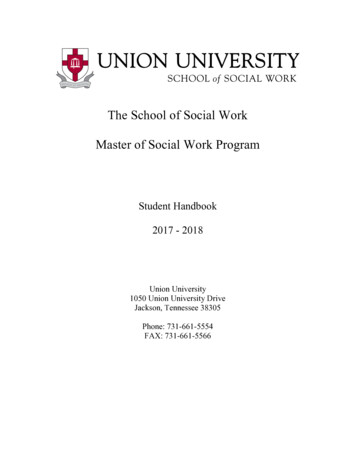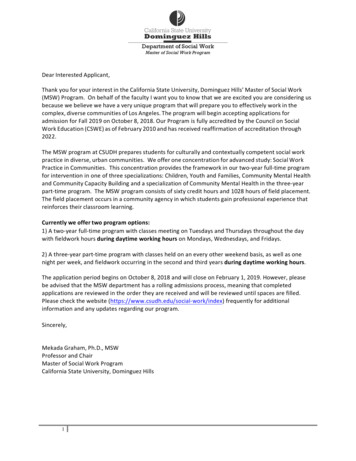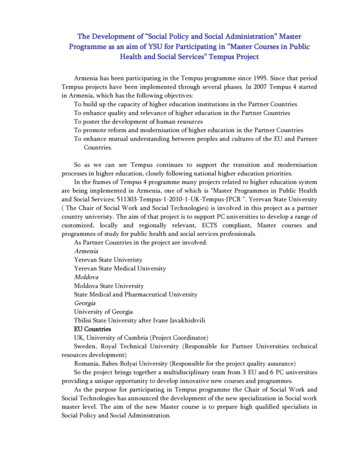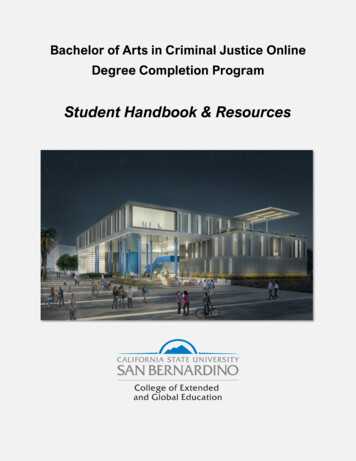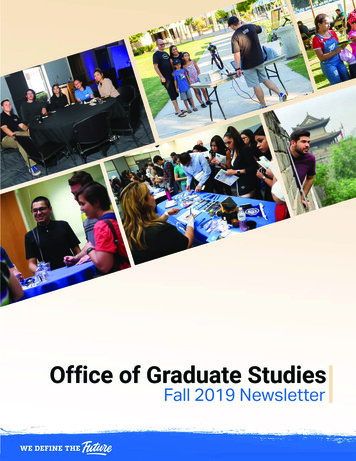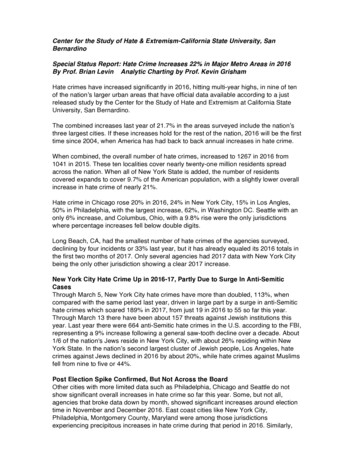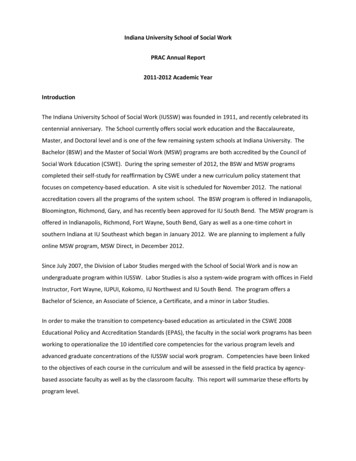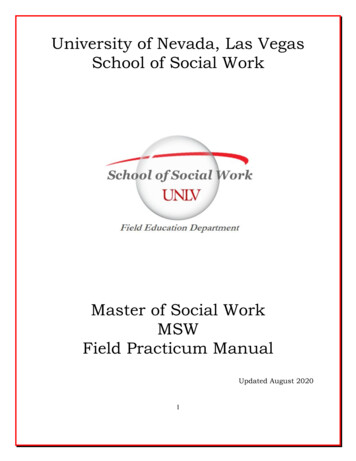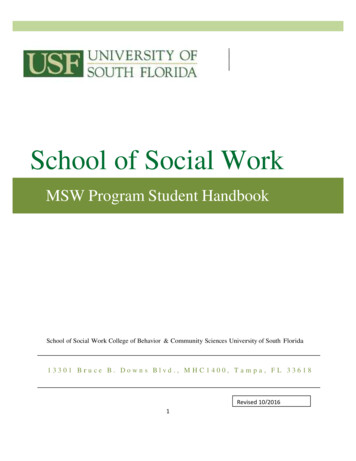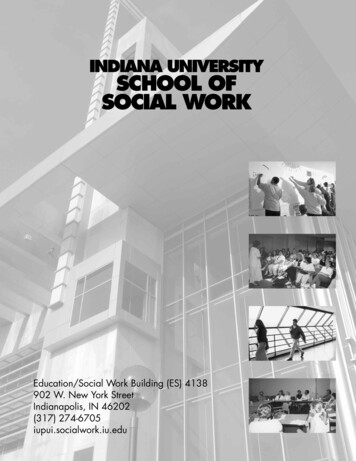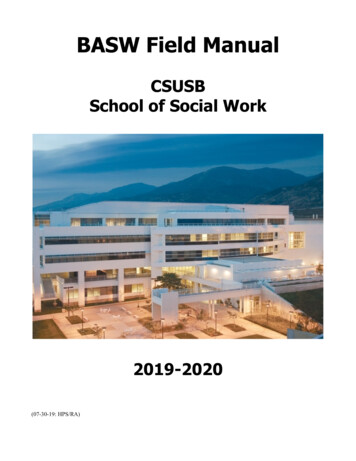
Transcription
BASW Field ManualCSUSBSchool of Social Work2019-2020(07-30-19: HPS/RA)
2PURPOSEThis field manual is designed to inform and guide BASW students, field instructors, preceptors, fieldliaisons, and others who are currently, or prospectively interested in, participating in the BASW fieldeducation program at California State University, San Bernardino. It is designed to answer the mostfrequently asked questions about the BASW field education program and its policies and procedures, aswell as to clarify expectations, rights, and duties of all involved in a social work field educationprogram. If you have any questions or feedback about any aspect of our BASW field education programor any material addressed in this field manual, you are always welcome to contact the BASW FieldEducation Coordinator and other field faculty, and the School fax number is (909) 537-7029.The contents of this manual are based on best practices within the field of social work guided by theNational Association of Social Workers (NASW) Code of Ethics, standards outlined through theCouncil on Social Work Education (CSWE) and policies specific to the University and the School ofSocial Work. Manuals from several Southern California Graduate Schools of Social Work (USC,CSULB, UCLA and Sacramento State University) were reviewed to assist in the development of theField Manual. Valuable suggestions and information were also provided by past and current departmentchairs, faculty members, field instructors, liaisons and BASW students.
3CSUSB School of Social WorkStudent Professional Field Commitment FormTo all social work students: Please complete and electronically sign this form in the InternPlacement Tracking system (IPT)(IPT www.alceasoftware.com)I have read and understand:1. Objectives of Field PracticumYesNo2. Sequence of Field ClassYesNo3. Roles and Responsibilities of Field StaffYesNo4. Roles and Responsibilities of Field InstructorYesNo5. Roles and Responsibilities of Field LiaisonYesNo6. Expectations for Field PerformanceYesNo7. Learning Plan Agreement FormYesNo8. Outcome EvaluationYesNo9. Grading Policies for Field PracticumYesNo10. Problem Solving ProcessYesNoIf you have marked ‘no’s’ to any of these areas, please make an appointment with the BASWField Education Coordinator (Dr. Shon) to clarify any confusion.This form should be completed and signed in IPT by your second week of field.Student SignaturePrint NameDate
4ARE YOU READY FOR FIELD?Have you informed the BASW Field Coordinator, in writing/e-mail or in person, of ANYincident that you have had with the criminal justice system that in any way could impingeon your ability to intern with any class of clients or at your agency in general?Have you completed, signed, and dated the above online Student Professional FieldCommitment Form at IPT’s website?Have you completed SW 300A and B, 302A and B, and SW 301 with a grade of C orbetter?Is your overall GPA 2.5 or better?Have you interviewed at your field placement agency and been accepted by the fieldinstructor and agency verbally or in writing?Have you checked with your agency about any pre-placement procedures required –background checks, orientations, etc.?If you answered “yes” to all these questions,then you are ready for Field!
5Table of Contents1.0 Introduction and Program Mission, Goals and Objectives1.1 School of Social Work Mission1.2 Accreditation Standard 2.2 – Field Education1.3 BASW Program Mission1.4 BASW Program Goals2.0 The BASW Curriculum3.0 The Baccalaureate Field Practicum: Purpose and Structure3.1 Purpose of The Baccalaureate Field Practicum3.2 Structure of The Baccalaureate Field Practicum4.0 Administrative Policies and Procedures4.1 Orientation4.2 Confidentiality4.3 Practicum Hours4.4 Attendance and Punctuality4.5 Furloughs and Mandated Time Off4.6 Holidays4.7 Illness and Other Emergencies4.8 Insurance4.9 Americans with Disabilities Act4.10 Criminal Background Checks (Live Scan)4.11 Immigration Status4.12 Safety4.13 Counseling4.14 Social Media4.15 Policy and Procedure for the Use of Employment Setting for Practicum4.16 Policy and Procedure for Application of Special Circumstances4.17 Withdrawal from Field Practicum Enrollment4.18 Student Request to Postpone or Quit a Field Placement4.19 Agency Dismissal of Students from Field Practice Sites and/or Field Seminar4.20 Interruption of Field Work4.21 Grievances and Appeals4.22 Repeat Policy (A Grade of No Credit in Field)5.0 Roles and Responsibilities in Field Education5.1 Social Work Student5.2 Coordinator of Baccalaureate Field Education5.3 Faculty (Field) Liaison5.4 Field Instructor5.5 Agency/Field Practicum Setting5.6 Preceptor5.7 Field Sequence Committee6.0 Placement Selection Process and Required Field Practicum Components6.1 Process for Placing Student6.2 Learning Plan Agreement6.3 Process Recordings6.4 Supervision6.5 The Field 18191919202020202323252525262727272828293030
66.6 Evaluation of Field7.0 Field Instructor Certification Training Program and Communication7.1 Special Note to Agency Executives and Field Instructors7.2 Orientation Check List for Social Work Interns and Field Instructors31333334
71.0 INTRODUCTION, SCHOOL AND PROGRAM MISSION AND GOALSWelcome to the California State University, San Bernardino, Bachelor of Arts in Social Work FieldPracticum Program. This Field Manual has been developed to provide information and guidance forstudents, Field Instructors, faculty, and others involved in the Field Program. The manual begins witha brief overview of the mission and goals of the School of Social Work, the objectives of the BASWprogram and curriculum. Next, the purpose and structure of the Field Practicum program is covered,including required hours, criteria for admission to field education, placement procedures, proceduresand qualifications for selecting field sites and instructors, expectations of students in the field, and thelearning agreement that shapes the student experience in the Field Practicum. The most current copyof the Manual will be maintained on the CSUSB School of Social Work website.The field education program is a means to achieve the goals of the BASW Program at CSUSB. It isstructured to meet the Accreditation Standards of the Council on Social Work Education (2015, CSWE),in particular Standards 2.2- Field Education and Accreditation Standards (EPAS, 2015) nine CoreCompetencies.1.1 School of Social Work MissionCSUSB’s School of Social Work Social Work program provides accessible, dynamic, and rigorousacademic programs that prepare students with generalist and specialized advanced generalistprofessional values, knowledge and practice skills to effectively enhance the well-being of thediverse populations and communities of our region, state and world.Accessibility means that we attract and retain a student population reflective of the region’spopulation and provide social work education opportunities to students in previously unservedareas.Dynamic means that we change and innovate to reflect changes in the professional knowledgebase, technology for practice and teaching, regional demographics and needs, and national andglobal trends that affect human well-being.Rigor means that the education is rigorous as demonstrated by comprehensive assessment of thevalues, knowledge and practice competencies that we expect our students acquire during theprogram.Serving the diverse populations and communities of our region, state and world means that ourprograms prepare students for practice in a regional, state and global context of dynamic diversity.1.2 Accreditation Standard 2.2—Field EducationThe field education program goals and learning objectives incorporate the overall goals of the School ofSocial Work Program at CSUSB. Field Practicum, Field Seminar, and Field Events are structured tomeet the Accreditation Standards of the Council on Social Work Education (2015, CSWE), in particularStandard 2.2-Field Education and incorporates the nine Social Work Competencies.The program discusses how our field education program:
82.2.1The program explains how its field education program connects the theoretical and conceptualcontributions of the classroom and field settings.2.2.2 The program explains how its field education program provides generalist practice opportunitiesfor students to demonstrate social work competencies with individuals, families, groups,organizations, and communities and illustrates how this is accomplished in field settings.2.2.4 The program explains how students across all program options in its field education programdemonstrate social work competencies through in-person contact with clients andconstituencies.2.2.5 The program describes how its field education program provides a minimum of 400 hours offield education for baccalaureate programs and a minimum of 900 hours for master’s programs.2.2.6 The program provides its criteria for admission into field education and explains how its fieldeducation program admits only those students who have met the program’s specified criteria.2.2.7 The program describes how its field education program specifies policies, criteria, andprocedures for selecting field settings; placing and monitoring students; supporting studentsafety; and evaluating student learning and field setting effectiveness congruent with the socialwork competencies.2.2.8 The program describes how its field education program maintains contact with field settingsacross all program options. The program explains how on-site contact or other methods are usedto monitor student learning and field setting effectiveness.2.2.9 The program describes how its field education program specifies the credentials and practiceexperience of its field instructors necessary to design field learning opportunities for students todemonstrate program social work competencies. Field instructors for baccalaureate studentshold a baccalaureate or master’s degree in social work from a CSWE-accredited program andhave 2 years’ post-social work degree practice experience in social work. For cases in which afield instructor does not hold a CSWE-accredited social work degree or does not have therequired experience, the program assumes responsibility for reinforcing a social workperspective and describes how this is accomplished.2.2.10 The program describes how its field education program provides orientation, field instructiontraining, and continuing dialog with field education settings and field instructors.2.2.11 The program describes how its field education program develops policies regarding fieldplacements in an organization in which the student is also employed. To ensure the role ofstudent as learner, student assignments and field education supervision are not the same as thoseof the student’s employment.Field education is the signature pedagogy for social work. The intent of field education is to integrate thetheoretical and conceptual contribution of the classroom with the practical world of the practice setting.It is a basic precept of social work education that the two interrelated components of curriculum—classroom and field—are of equal importance within the curriculum, and each contributes to thedevelopment of the requisite competencies of professional practice. Field education is systematicallydesigned, supervised, coordinated, and evaluated based on criteria by which students demonstrate theSocial Work Competencies. Field education may integrate forms of technology as a component of theprogram (CSWE, 2015).A competency-based approach refers to identifying and assessing what students demonstrate in practice.In social work, this approach involves assessing students’ ability to demonstrate the competenciesidentified in the educational policy.
9Assessment of student learning outcomes is an essential component of competency-based education.Assessment provides evidence that students have demonstrated the level of competence necessary toenter professional practice, which in turn shows programs are successful in achieving their goals(CSWE, 2015).Competency-based education is an outcomes-oriented approach to curriculum design. The goal of theoutcomes approach is to ensure that students are able to demonstrate the integration and application ofthe competencies in practice (CSWE, 2015).CompetenciesCompetency 1:Competency 2:Competency 3:Competency 4:Competency 5:Competency 6:Competency 7:Competency 8:Competency 9:Demonstrate Ethical and Professional BehaviorEngage Diversity and Difference in PracticeAdvance Human Rights and Social, Economic, and Environmental JusticeEngage in Practice-informed Research and Research-informed PracticeEngage in Policy PracticeEngage with Individuals, Families, Groups, Organizations, and CommunitiesAssess Individuals, Families, Groups, Organizations, and CommunitiesIntervene with Individuals, Families, Groups, Organizations, and CommunitiesEvaluate Practice with Individuals, Families, Groups, Organizations, and Communities1.3 BASW PROGRAM MISSIONCSUSB’s School of Social Work provides accessible, dynamic, and rigorous academic programsthat prepare students with generalist and advanced generalist professional values, knowledge andpractice skills to effectively enhance the well-being of the diverse populations and communities ofour region, state and world.1.4 BASW PROGRAM GOALS1. Enhance social work educational opportunities for students within our region and in unservedareas through increasing accessibility and program completion, especially for first generationcollege students, students from the dynamically evolving ethnic communities in our region, andstudents in remote areas.2. Continually update curriculum and teaching practices with current research and best practicesreflective of the needs and trends of our region, nationally, and globally.3. Offer and measure attainment of a competency-based, foundation and advanced level curriculumconsistent with the needs of our area for practice skills with individuals, families, groups,organizations, communities and the skills of policy advocacy.4. Offer a curriculum that emphasizes practice consistent with the aims and values of the socialwork profession and that meets the needs of diverse, vulnerable, and underserved populations,especially in our region.5. Support faculty in providing leadership to the profession and to the community with theirresearch and expertise.
102.0 THE BASW CURRICULUMThe Bachelor of Arts degree in Social Work (BASW) encompasses a liberal arts perspective and aprofessional foundation. The liberal arts perspective provides broad-based knowledge and preparesstudents to think critically and communicate effectively about society, people and their problems, art,literature, science, history, and philosophy. The liberal arts base is gained through required generaleducation courses and other specified prerequisites.The professional foundation teaches students about social work values and ethics, human behavior andthe environment, social work practice, research, social welfare policy and services, and provides theopportunity to apply this knowledge through field practicum.The BASW prepares students for generalist social work practice for work in agency settings withindividuals, families, groups, and communities who are encountering problems related to personal orsocial circumstance. The curriculum is intensive and exciting and applies to a wide variety of socialwork client populations. The BASW upper division curriculum was developed based upon the standardsof the Council of Social Work Education (CSWE), the national accrediting body for social workprograms.Below is a table indicating the courses in the major and when they are taken. More detailedinformation on the curriculum is available in the BASW Student Handbook and the Social WorkSchool Website at http://socialwork.csusb.eduTable 1: Courses in the Social Work MajorCOURSESW 200 Introduction to Social WorkSW 300A Policy ISW 300B Policy IISW 302A Human Behavior in the SocialEnvironment ISW 302B Human Behavior in the SocialEnvironment IISW 301 ResearchSW 400A Social Work Practice: IndividualsSW 400B Social Work Practice: Families and GroupsSW 400C Social Work Practice: Organizations andCommunitiesSW 401A Field WorkSW 401B Field WorkSW 401C Field WorkSOC 590 ElectivePREREQUISITEPre-major courseAdmission to MajorSW 300AAdmission to MajorSW 302AAdmission to MajorCompletion of courses below 400level and consent of instructor400A and consent of instructor400B and consent of instructorCompletion of courses below 400level and consent of instructorCompletion of courses below 400level and consent of instructorCompletion of courses below 400level and consent of instructorSpecial topics in social work. Maybe repeated for credit with consentof instructor as topics change.
11Prerequisite: junior, senior orgraduate standing.3.0 THE BACCALAUREATE FIELD PRACTICUM: PURPOSE AND STRUCTURE3.1 PurposeField Work plays a pivotal role in the BASW curriculum. It offers the opportunity to apply, refine andintegrate conceptual based knowledge acquired in the classroom with real life experiences in socialagencies.Field Work at the CSUSB School of Social Work consists of three components: 1) field practicum, 2)field events, and 3) field seminar. Through field work, field events and field seminar students will beable to demonstrate knowledge and level of competence necessary to enter professional practice. Thefield experience and classroom should be mutually reinforcing in all curricular areas: research, humanbehavior, social policy, and practice with individuals, groups, organizations and community.3.2 Structure3.2.1 Placement Concurrent with ClassesThere are three sequential field practicum courses (401ABC) that run concurrently with classes. Webelieve the best transfer of learning takes place when students are able to practice the skills they arelearning in a real social work environment at or around the time they are learning these skills. Studentshave the opportunity in class to learn "about" skills (such as interviewing) in a cognitive way and then topractice them in class role plays. They see the instructor demonstrate skills (and/or videotapedexamples) and then they practice skills and see others practice skills. While these learning experiencesare still very fresh in their minds, students have the opportunity to practice these same skills in their fieldplacements. Students then have the opportunity to provide the class and instructor with feedback on howinterviewing was actually experienced in a social work agency and/or to process it with field instructorsand in the Field Seminar.3.2.2 Student Involvement in Placement ChoiceBASW field placements are assigned by the BASW Field Coordinator or BASW Title IV-E FieldCoordinator. The student’s interest, learning needs and agency availability are taken intoconsideration. (See ‘FIELD PRACTICUM; PLACEMENT PROCESS AND REQUIREMENTS’ forfurther detailed information)3.2.3 Four Areas of Practice ExperienceStudents are expected to complete field practicum assignments in four areas of practice. Areas of MICRO practice include:1. Working with individuals & Families2. Working with small groups Areas of MACRO practice include:
123. Working with agency administration4. Working with communities4.0 ADMINISTRATIVE POLICIES AND PROCEDURES4.1 OrientationStudents attend two pre-field orientations, one in the spring prior to their senior year and one in Augustprior to their senior year. The pre-field in spring reviews the placement process and field programrequirements. The mandatory August orientation reviews the field program mission, policies andstructure, documentation, competencies, and expected outcomes. The purpose of orientation is toprovide an overview of the various roles, responsibilities and expectations of the student, FieldInstructor, Faculty Liaison, and Coordinator of Baccalaureate Field Educatio
Council on Social Work Education (CSWE) and policies specific to the University and the School of Social Work. Manuals from several Southern California Graduate Schools of Social Work (USC, CSULB, UCLA and Sacramento State University) were reviewed to assist in the development of the Field Manual.
